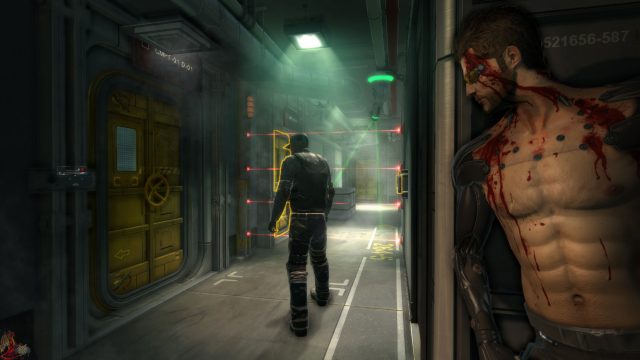Deus Ex: Human Revolution PC Retroview
Join the Human League
Deus Ex: Invisible War was many things, but a triumphant continuation of the first Deus Ex was not one of them. The franchise lay dormant for years, until Deus Ex: Human Revolution came along to attempt a revival. It succeeded well enough that more Deus Ex games are now an expected thing, and the release of a Director’s Cut has helped Human Revolution fix a few of the problems that afflicted its original launch. Human Revolution may not quite recapture the glory of the original game, but it comes pretty close in many instances.
2027 features a number of correlated events. Protests against people being augmented with mechanical parts are ramping up worldwide, the global corporate leader in augmentation technology is assaulted by a group of effective and efficient killers, mysterious projects are being constructed in remote parts of the globe, and rioters are prone to shaking things up. Ex-police officer Adam Jensen figures into this by being the head of security at Sarif Industries, and while fighting against an attack by mysterious gunmen he is shot down. The company’s eponymous leader decides to augment Adam rather than let him die, and six months later unraveling exactly what took place during that incursion becomes Jensen’s motivation. Plenty of other issues pop up, but piecing this trail together is the thread linking them.
While its depiction of 2027 is already suspect in certain regards, notably in the way that holographic newspapers are posited to become the preferred means of learning about world events, Human Revolution does a fine job in most respects of crafting an interesting narrative. Adam Jensen is an effective lead, and the multitude of characters with whom he interacts is at the very least entertaining to behold. Individual moments along the way make it difficult to suspend the player’s disbelief, but they’re no worse than many well-regarded action movies in which the suspicions of an entire city are somehow not roused when copious gunfire erupts. What the narrative succeeds in doing is making the player stay interested in its events, and the wild ride it depicts remains gripping until the conclusion. The finale is an unfortunate excuse for multiple stock footage deployments, but this can be overlooked when what led up to it was effective.
Adam Jensen controls similarly to J.C. Denton in the original Deus Ex, with many of the same options at his disposal while navigating the FPS-like environments. Taking the straightforward tactic of killing everyone in his path is possible, but even as an augmented human Adam doesn’t take repeated explosive blasts to the face very well, and his foes are pretty accurate. Less obvious methods of progress are always available, running a wide gamut such as uncovering codes that open side doors or crouching inside air ventilation shafts. Adam has a notable advantage over J.C. in that he does not need a weapon to take people down at close range, and knocking out or killing opponents via the press of a button is a simple task. Plenty of other methods are available for taking out enemies at a distance, from tranquilizer darts to heavy machine guns. There is also the option of attempting to remain unobserved while engaging in no direct combat except the takedown, which can be difficult but is doable. Like the original Deus Ex, there are multiple ways to approach every situation depending upon what the player feels like.

While Adam could probably find a way to get by without violence, that’s just not as entertaining to watch.
In Deus Ex and Invisible War, adversaries displayed poor short-term memory and often did not react to the sight of their compatriots lying incapacitated on the ground. Human Revolution has a new AI program, one in which opponents will actually react to the sight of an unconscious or dead colleague in plain sight by becoming alarmed, and will start firing almost instantly upon sighting an obvious intruder. Thus Adam’s ability to drag the helpless bodies of foes out of view takes on great importance, though enemies will still have the problem of not remembering that a friend was patrolling the area until thirty seconds prior. Enemies are also prone to forget the detonation of explosives or the use of gunfire after a minute or so has passed. This makes dealing with their AI an interesting proposition, but not exactly a realistic one. Something new is the ability of fellows to revive their unconscious compatriots if given a few seconds, no matter how powerful the method of inducing unconsciousness was, which may not make much sense but does create an added incentive to move limp bodies out of sight.
At the game’s beginning Adam is able to gradually regenerate his health, but most other aspects of his newly augmented body are undeveloped. Human Revolution sports a sizable upgrade path for his abilities that is enabled by gaining experience, and the techniques unlocked by this system greatly affect how the game can be played. Adam is unable to hack most devices without enhancing his aptitude for that activity, but at the highest level he can open numerous doors and security systems to broaden his options. Without a technological upgrade Adam is surprisingly vulnerable to death by falling a short distance, but after enhancing that aspect he can leap off the tallest skyscraper with no worries. It is possible to fully unlock everything of which Adam is capable, but that will only happen close to the conclusion, ensuring that the player should take care in planning his development.
One aspect of Human Revolution that is a mammoth regression from the original Deus Ex proves to be its inventory. While the original game could be restrictive by not allowing everything potentially useful to be picked up, Human Revolution makes everything far less user-friendly. Each weapon has a different type of ammunition that cannot even stack in the same area for long before needing a new part of the inventory, and when the firearm itself takes up still more limited space, holding clips for more than a couple at a time demands great concentration. A common procedure is the need to dump several items onto the floor in order to use something with one application, then pick up everything that was just discarded. Doing this ceases to be entertaining long before the conclusion.
Human Revolution‘s Director’s Cut makes a few changes to the original release, a big one happening during boss encounters. The narrative attempts to lead up to these by making it clear that Adam and a trio of soldiers present for the incursion at the game’s beginning have unfinished business, and in each case someone must die. In the Director’s Cut these fights stick out by suddenly displaying opponents who can absorb a huge amount of punishment before dying, at least compared to every other antagonist, but triumphing is not as problematic as in the original title. These battles still don’t gel with the rest of the game since several other encounters play out with Adam being able to persuade an opponent into surrender through conversation, but they’re not as frustrating now.
This Director’s Cut also includes the additional section near the end called The Missing Link, in which Adam is found on a ship at sea and must escape. This location is interesting both from a visual perspective, as it affords an opportunity to see dark greens and blues that are rare in the rest of the game, and for stripping Adam of all his enhancements to force the player to start from scratch. While the enhancements will be reacquired during this part, it serves as a good reminder of how far Adam will have come by this point. The Missing Link‘s setting and situations are quite interesting as well, making its inclusion a good thing.
Human Revolution is a good-looking game, with a variety of locations that don’t blend into each other and multiple character models to keep the procession of NPCs distinct. Its lighting scheme relies heavily on reds, oranges, and yellows, but even this somewhat limited palette varies with each location enough to keep them distinct. Most of the music is effective in a cinematic way, though it’s rarely memorable if the player pays close attention. Considering that numerous performers are called upon to voice more than one role, the strong work they turn in is commendable, and enlivens many scenes. This is a title in which sound effects are of great importance though, and being able to hear what enemies are doing is the most critical element of the audio — which is delivered.
While a difficulty select is available, Human Revolution can be completed with a bit of patience by almost anyone, due to the ability to save at any time enemies are not directly trying to kill Adam. The presence of multiple methods to conquer any challenge allows each player to pick and choose, or to deliberately attempt the harder options. While plowing through the core story without going onto tangents can probably be accomplished in thirty hours, exploring just a bit uncovers multiple side missions that flesh out the world quite a bit and are interesting unto themselves. Doing everything available in a single playthrough will probably take fifty hours, but none of the extras feel like filler.
Aside from its inventory, the biggest complaint to lodge at Deus Ex: Human Revolution is the many references it makes to the original Deus Ex. Most of these are identifiable but serve no further purpose, except to perplex and confuse. I can’t complain about much else in the game though, which is an immersive and fascinating experience throughout. Others clearly thought so too, as Human Revolution managed to revive the series. If Mankind Divided keeps to this level of quality, that will be a very good thing indeed.


Fascinating character development
Director's Cut additions are nice
Effective revival of Deus Ex mechanics
Goofy AI
Irritating inventory







Recent Comments